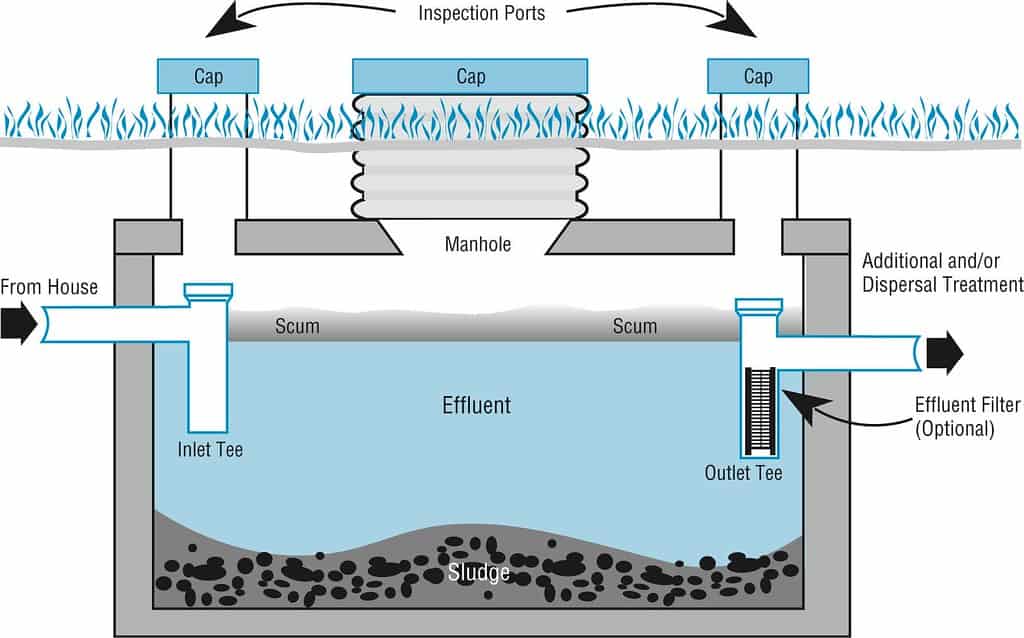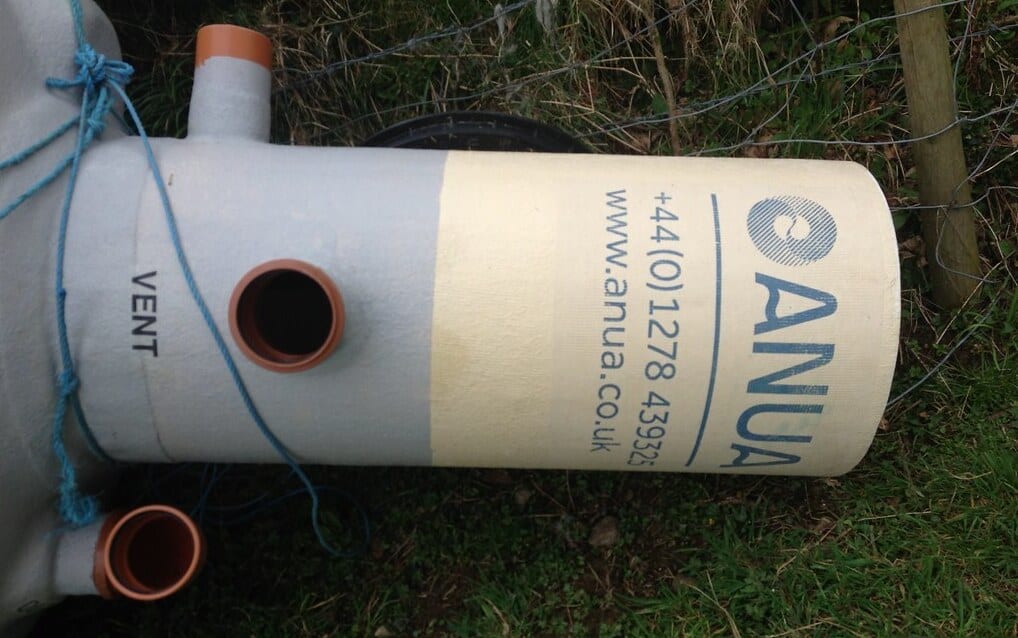Installing a septic tank is not as complex as one might think. The process begins with finding a suitable space and ends with covering the septic tank with dirt. Of course, the installation is more in-depth than that, which is why most people opt to hire a contractor to oversee the installation.
If this is your first time installing a septic system, you need to determine which type is more suitable for your needs and preferences. You can choose from a gravity-fed or aerobic treatment unit. You’ll also need to decide how you’re going to ventilate your septic system.
Today the topic of discussion is septic tank ventilation.
Does a septic tank need a vent pipe?
Yes, every septic system needs a vent pipe. The vent allows septic gases to exit the system, so it is not allowed to build up and cause an explosion. As the tank is filling up with waste, it is generating malodorous gases, better known as septic gases. These gases are extremely toxic. To eliminate the risk of buildup of the septic gases, a process that is known as septic venting is utilized for safe ventilation.
What Is The Purpose Of A Septic System?
Septic systems are structures built underground to treat wastewater. These systems are utilized in areas where city sewage is not available. City sewage is connected by underground pipes that allow the waste to travel to a waste treatment facility, where it is cleaned and released back into the environment.
Underground septic tanks perform in the same manner as a waste treatment plant. The waste drains into the tank, where the solids are separated from the liquids. The liquids (effluent) are discharged from the tank into what is known as a leach field. The effluent eventually absorbs back into the environment.
Keeping Your Septic Tank Well Ventilated
Just because you have a septic tank installed with a vent or move into a home with an existing system it doesn’t mean that all your troubles and woes are over.
No, it will be your job as the homeowner to ensure that the septic system always stays well ventilated. In fact, it will be in your best interest to do so.
If you do not it could not only potentially cause you problems with your drainage, but it could cause lingering sewage odors throughout the home and yard. This is something that no one wants, especially not your neighbors.
That being said, one of the best ways to ensure that your septic system vent always stays well ventilated is by keeping a close eye on the vent. This will be located on the roof of the home. It will usually be a 3 or 4-inch plastic white PVC pipe. You will want to make sure that the vent is clear of bird’s nests or other potential blockages.
Using toilet paper not suitable for a septic system is one of the main causes of blockages. Therefore, you should checkout my article on Septic-Safe Toilet Paper.
One of the best ways to eliminate the worry of a blockage is by installing a vent cover if these already isn’t one in place. While the vent cover will not make the entire process maintenance-free, it will prevent birds, squirrels, and other critters from nesting in the septic venting.
Different Septic Ventilation Methods
Another important thing that needs to be noted about the septic system is that it can be vented in several different ways.
The method by which your system is vented can depend on several factors. It might depend on the local rules and regulations or it might depend on the type of septic system that you have.
Some homes require different septic setups and some states may require certain types of venting for that system. Of course, this is all going to be handled by contractors and city officials. What you really need to know is that there are several different methods in which these systems can be vented.
The first and most common is the roof vent.
When the system is first installed there will be a pipe that runs underground from the septic system through the roof of the home. The septic system will vent through the roof of the home. This means that in order to maintain and repair the vent, you will have to get on the roof of the home.
Other systems are simply vented through the yard. You will just have a PVC pipe sticking up in your yard where the gases from the tank are emitted.
See the diagram below of a yard-based septic ventilation system.

Septic Vent – What Does It Do?
Now, you should find out what a septic vent does.
While it might sound complex, the septic vent is straightforward. Once you’ve figured out the basics, you’ll see that the septic vent is simple.
For instance, it is designed to solve several problems. For instance, the vent is going to help reduce the likelihood that gases are going to build up. The build-up of gases could be dangerous. Airlocks are another problem. If an airlock forms, there is a good chance that you’re going to have major problems on your hands.
A vent will help. The vent will allow the air to escape so you don’t have to worry about dangerous gases building up. A septic vent can help you avoid additional issues in the future. Therefore, it is a good idea for everyone to make sure that their septic tank is equipped with a reliable vent.
Do I Need A Septic Tank Vent?
A lot of people believe that septic tank vents are not necessary but this couldn’t be further from the truth. Septic vents are vitally important.
If your septic tank does not have a vent, there is a good chance that you’re going to run into major problems. The gases will build up and this will create a horrible odor in your backyard. That odor may eventually infiltrate your home. Suffice to say, you need to remedy this problem immediately and a good vent will help you avoid these issues.
Septic tanks need vents. With a good vent, you’ll be able to avoid numerous problems and prevent your home from smelling horrible. With that being said, you should make sure that your septic tank has a vent. If it doesn’t, you should speak with a professional so resolve this problem immediately.
Overall
At the end of the day, your septic tank system ventilation is vitally important. If your septic tank is not properly ventilated, there is a good chance that problems are going to occur. You need to make sure that your septic tank vent is clean.
You might find a septic vent pipe in yard or it might be elsewhere. Either way, you need to solve this problem immediately. Use the advice provided on this page to deal with the issue immediately.
Pump Septic System
An alternative to the conventional septic system is known as a pump system. The system utilizes a pump to help push the effluent through a bed of organic matter, such as sawdust and peat, sand, and man-made wetlands. The pump works efficiently to push the liquid waste out of the tank and into the wetlands. Once the wastewater makes it to the wetlands, pollutants, such as nitrogen, disease-causing pathogens, and phosphorus, begin to neutralize.
Some alternative systems utilize technologies to disinfect or evaporate the liquid waste before it is discharged back into the environment. These systems work very efficiently, which is why they are more popular among environmental-friendly households.
FAQs
If you’re going to be installing a septic tank in the future, there is a good chance that you’ll need to perform a perk test. Depending on where you live, you may be able to do this without a professional.
However, some jurisdictions require consumers to hire a professional to perform the test.
Therefore, you’ll need to do some research before moving forward. To perform the test, you’ll need to dig a few test holes, saturate the oil, and perform the test. It is a good idea to create a table for the results so the information will be easily presentable.
Ultimately, septic tank system ventilation is far more important than more people will ever imagine. Without proper ventilation, your backyard is going to smell like gas. While the smell is horrible, you have to understand that it can be dangerous too. The gas can accumulate and create numerous problems. Therefore, it is best to use vents to get rid of the gases in a safer way.
If you’re going to be installing a septic tank in the future, there is a good chance that you’ll need to perform a perk test. Depending on where you live, you may be able to do this without a professional.
However, some jurisdictions require consumers to hire a professional to perform the test.
Therefore, you’ll need to do some research before moving forward. To perform the test, you’ll need to dig a few test holes, saturate the oil, and perform the test. It is a good idea to create a table for the results so the information will be easily presentable.
Ultimately, septic tank system ventilation is far more important than more people will ever imagine. Without proper ventilation, your backyard is going to smell like gas. While the smell is horrible, you have to understand that it can be dangerous too. The gas can accumulate and create numerous problems. Therefore, it is best to use vents to get rid of the gases in a safer way.
At some point, your roof vent may get clogged. If this happens, you’ll want to remedy the problem as quickly as possible. Otherwise, you’re going to run into major issues. The good news is that you can solve this problem without a few basic tools. First, you’ll want to use a drum auger. You can find hand-held models. You can use the auger on your roof to clean the vent. If that doesn’t work, you should try utilizing a sewer jetter.
Alternatively, you may want to consider hiring a professional. If you’re going to hire a professional, you need to do some research to ensure you get the best one for your money.
The main reason why septic tanks are buried underground is that they take up a lot of space. They would also be an eyesore if they were built on top of the ground. Gravity-fed septic systems would not work efficiently if they were not buried. These systems rely on gravity to allow the waste to flow into and out of the septic tank.
Your septic vent will solve numerous problems. However, you may find that your vent has a bad odor. This is a common problem, but it shouldn’t be too serious.
Anaerobic activity will lead to the creation of smelly odors. Simultaneously, there is a chance that hydrogen sulfide gas will be emitted through the pipe. This can lead to the pipe putting off a smell that resembles rotten eggs. The smell may linger for a day or so and disappear. Or, it might be intensified by gusty winds.
It could also be sludge stuck to the walls of your pipes. To deal with this you can use products such as Rid-X. You can find it on Amazon by clicking here. However, I’d recommend checking out my guide to find out if Rid-X really works.
When you smell a terrible odor, you must remember that it might not be a plumbing issue. Therefore, you shouldn’t overreact. If the odor remains for many days, you should take action. This could be a sign that you’re dealing with a clog or another issue with your septic system. With that being said, you should contact a plumber if the smell has stuck around for a few days.
My name is Eugene Thornhill. I'm an outdoor enthusiast who loves nothing more than being one with nature. I've lived in numerous outdoor homes and even constructed my own. Living off-grid is something I'm very familiar with, more so than living in the city. For many years I've dealt with the many problems of living off-grid. It's time to pass on my knowledge through Cabinguides.


